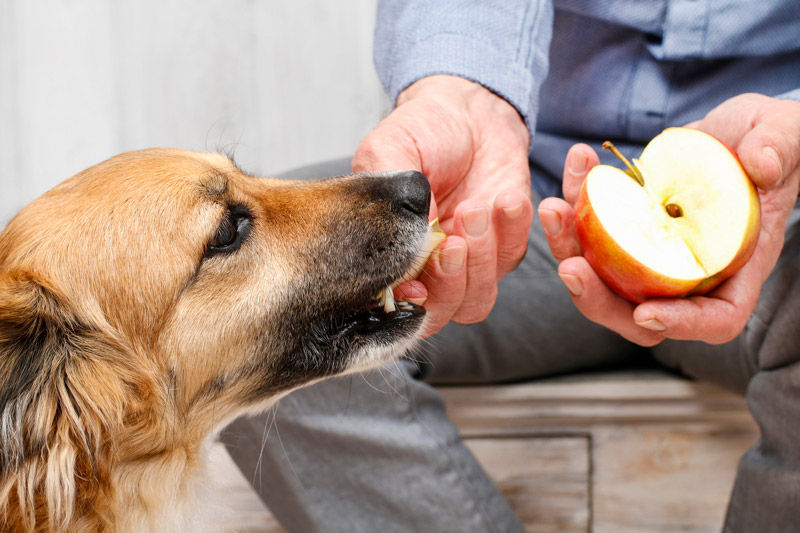Health
Can Dogs Eat Apples?

Sometimes we forget that dogs are not human. We go to bed with them, wake up with them, exercise with them, watch TV together; we even have conversations with them!
It’s no wonder that we often think our dogs are little humans that can eat whatever we can.
More than once I’ve caught myself about to slip my dog some tasty random morsel only to stop myself and wonder- can my dog actually eat this? So let’s pause for a moment and discover if one of those tasty treats (apples) are on the do not fly list.
It is first very important to realize, however, that dogs are physiologically very different from humans, especially when it comes to what they can and can’t eat. So it’s always best to do your due diligence and do the research prior to feeding them any human food.
Can my dog eat apples?
The simple answer to this question ‘can dogs eat apples’ is yes.
It is fine to feed your dog apples with the skin attached, as an apple’s skin contains fiber and phytonutrients that protect against some forms of cancer. The firm yet juicy texture of apples also means that they are great for naturally cleaning your pet’s teeth and will also contribute to your dog having fresher breath. So- save your money on those fancy teeth cleaning treats.
Dogs are natural carnivores and all fruit should be given to your dog in moderation. While apples contain naturally occurring sugar, it is still sugar and when consumed in large quantities, fruit can contribute to weight gain.
So, can dogs eat apples? You bet they can!
Apples are a healthy, delicious and cheap alternative to traditional commercial snacks. Just make sure you prepare them correctly and feed them to your dog in moderation.
Can my dog eat apple cores?
The main issue with whether or not dogs can eat apple cores is choking.
Of course, small dogs and puppies are more at risk. But since the seeds of the apple are also found in the apple core, it’s probably best not to let your dogs eat apple cores regardless of their size or age.
Simply slice the apple into pieces and throw the core, seeds, and stem away or add them to your compost bin. What kind of apples can they eat?
There are no specific apple varieties that are off limits, I would choose whatever you would eat.
There are types that your dog would probably prefer over others, with the sweeter kind more likely to spark their appetitie.
Think of Gala, crisp and very sweet. You’ll go gaga for Gala! There is Fuji, crunchy and super sweet, Granny Smith, crunchy and tart, Honeycrisp, crisp and distinctly Sweet, Cripps Pink, crunchy and sweet-tart and Golden Delicious, crisp and sweet.
Green apples are a little sourer than red apples, so your dog might not be as enthusiastic to chow down. But they offer the same benefits nonetheless.
Varieties like Granny Smith, Pippin, Crispin, and the Japanese- Shizuka are generally crisp, tart fruits using for baking goodies like apple pie.
Golden Delicious apples are not strictly green in color and are sweeter than the true green apples. Regardless of the variety, a bite of green apple is a safe, wholesome treat for your dog.
What about Applesauce?
While your canines are not supposed to ingest apple core, can dogs eat applesauce?
Applesauce is an excellent treat which supports your dogs’ health. Hence, dog owners are allowed to mix the treat with their pets’ food. As long as the applesauce is given in moderation, your pet can gain various health benefits while avoiding its side effect.
If you want to reap the best benefits of the treat, choose the unsweetened and organic ones.
This will makes sure that your pets would not ingest unnecessary and toxic substances. You can even add applesauce into recipes if you make homemade treats, and even freeze it for a cool summer fix.
Exactly how should I feed them to my dog?
If your dog has diabetes or cancer, check with your vet before feeding your dog apples due to their sugar content. It is very important to remove all of the seeds from an apple before feeding it to your dog, because apple seeds contain amygdaline which is processed by the body into cyanide.
While a few stray seeds won’t harm your pet, cyanide can be deadly at higher doses or if your dog is chronically exposed to it.
When preparing apples for your dog, discard the core entirely as this contains the seeds and can be a choking hazard. Some dogs may be put off by the slightly tangy taste of apples (especially the tart green varieties).
It’s best to cut an apple into bite-sized chunks before serving. Be sure to remove all seeds, which contain small amounts of cyanide, and toss out the apple core, which can be a choking hazard.
Introduce apples into your dog’s diet gradually, and serve in moderation as a treat or added to your dog’s usual meal.
Plain old apple slices are a great choice for your dog! During the summer try freezing the slices to give your dog a cool snack with some extra chewing time. Looking for a little extra challenge? Chop your apple slices into small chunks, and freeze in a bowl of water for an apple “popsicle”.
Apples, apple cider vinegar, and applesauce can be added to yummy recipes for your pup to eat.
You can even combine other fruits, veggies, and dog-safe foods like peanut butter, into your treats. This can be a good idea to sneak some extra nutrients into a snack for picky pups! You can also bake them into puppy approved recipes and get fancy with it!
Are they healthy to feed my dog? What are the benefits?
Apples are a suitable and delicious treat for dogs and contain many important vitamins and nutrients including:
- Pectin — pectin is a highly soluble fiber that can help regulate bowel movements and reduces inflammation associated with diarrhea. It can also help to eliminate toxins and move waste more efficiently through the body.
- Omega-3 and Omega-6 fatty acids — Omega-3 fatty acids help to control inflammation, ease arthritis pain, and are beneficial to the kidneys and heart. - Omega-6 fatty acids help fight infections and promote a glossy, healthy looking coat.
- Vitamin-C — Vitamin-C is important as it promotes red blood cell production and is required for healthy brain function. It is required for the efficient absorption of other vitamins and proper immune system function and can also slow degenerative joint disease and hip dysplasia.
Recommended: What Fruits Dogs Should Eat: The Ultimate List
Are there dangers to be aware of?
The main things to watch for when feeding apples to dogs; are seeds and cores. The seeds contain trace amounts of cyanide, which is toxic. It would take quite a few seeds to cause any kind of cyanide poisoning, and if your dog swallows a few, it isn’t likely to cause harm. Even so, it’s not necessary to risk your dog’s health, so remove the seeds before you feed your dog apples.
Some suggest that stems may be dangerous, as well, so it’s best to remove stems, too. The core of the apple is firm and difficult for most dogs to chew. It may present a choking hazard or, if swallowed, cause gastrointestinal blockage. Although a seed or two wouldn’t poison your dog; but because the tough center of the apple can be a choking hazard, particularly for small dogs.
Although there are some risks if your dogs eat an apple without any supervision, since the seeds in the apple core have been removed, these nutrients can be consumed by your pooches worry-free.
I didn’t mean to scare you. If your dog swallows a few seeds, his body will detoxify itself. But, if your dog ingests large quantities of apple seeds, it can cause major damage! Why? Apple seeds contain amygdaline, a form of cyanide, which is extremely dangerous, as it prevents the blood from carrying oxygen throughout the body.
So, if you’re going to give your dog apples, core the apples. Then, cut them into bite-size pieces and feed the dog this way. This may seem overly cautious, but why take the chance on a loved one?
Summary
So what can we take away from this? Apples seem to be healthy, if done properly and offer many benefits. Seems to also be a cost effective treat substitute for keeping your pooch’s teeth clean, who doesn’t love that? Or should I say whose wallet wouldn’t love that?
Raw apples contain vitamin A, vitamin C, vitamin K, dietary fiber, calcium, phosphorus, and antioxidants. These nutrients are beneficial for dogs. Thus, apples and applesauce is one human food which can be both safe and beneficial for your pets.
Apples contain sugar, so serve them in moderation. The sugar content cause problems for dogs who suffer from cancer or diabetes, which is another reason you should ask your veterinarian before giving them to your dog. Additionally, too many apples can cause an upset stomach or diarrhea, even in healthy dogs.
- Topics:
- Health


